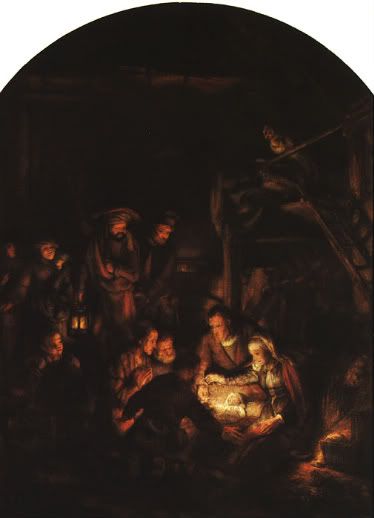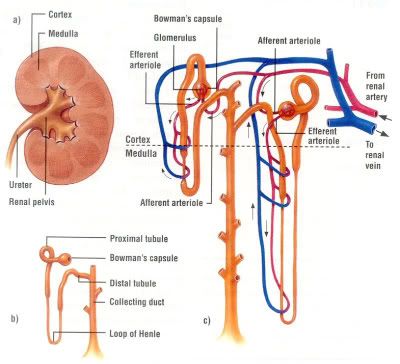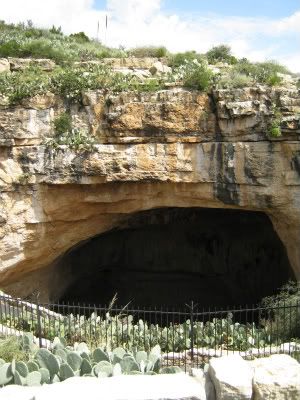
The mystery of the humanity of Christ,
that He sunk Himself into our flesh,
is beyond all human understanding.
- Martin Luther (H/T: T19)

The mystery of the humanity of Christ,
that He sunk Himself into our flesh,
is beyond all human understanding.
- Martin Luther (H/T: T19)

. . . He took to Himself a body, a human body even as our own. Nor did He will merely to become embodied or merely to appear; had that been so, He could have revealed His divine majesty in some other and better way. No, He took our body, and not only so, but He took it directly from a spotless, stainless virgin, without the agency of human father - a pure body, untainted by intercourse with man. He, the Mighty One, the Artificer of all, Himself prepared this body in the virgin as a temple for Himself, and took it for His very own, as the instrument through which He was known and in which He dwelt. Thus, taking a body like our own, because all our bodies were liable to the corruption of death, He surrendered His body to death in place of all, and offered it to the Father. This He did out of sheer love for us, so that in His death all might die, and the law of death thereby be abolished because, when He had fulfilled in His body that for which it was appointed, it was thereafter voided of its power for men. This He did that that He might turn again to incorruption men who had turned back to corruption, and make them alive through death by the appropriation of His body and by the grace of His resurrection. Thus He would make death to disappear from them as utterly as straw from fire.- St. Athanasius (293-373 A.D.), from On the Incarnation
In the quote below Lars Levi Laestadius, the great Swedish Lutheran revival leader, expresses the hope of the repentant sinner, that they would see "the Lord's Christ." Laestadius here must be taken to mean that the repentant who desire a savior will see Christ spiritually in this life when God gives them the grace to believe on Him. It is not that he was speaking of the time when all will see Christ at His return to judge the living and the dead. This is clear because near the end of the quote he speaks of those few who already "have seen Christ." As is often the case with Laestadius, perhaps because of poor translations, there is a sentence which I don't understand which reads, "They must also come into the temple through the effect of the Spirit, in that covenant when the Lord's Christ is carried in there." It is obviously a reference to Simeon being in the Temple and Christ being carried there by His parents but I'm not sure how it applies to the individual believer today.
But, on the whole, I felt that this was a good Advent quote and also appreciated the fact that he mentions one of the verses from Job I wrote about in my last post.
Then with better confidence than before he can say to the servant of self-righteousness, "I know that my Redeemer liveth, and that He shall stand at the latter day upon the earth: And though after my skin worms destroy this body, yet in my flesh shall I see God." And as that saint Job had received that blessed assurance, that in his flesh he shall see God, so also old Simeon had received that assurance from the Holy Spirit that he should not taste death before he had seen the Lord's Christ. And the same assurance is given even yet to all the sorrowful, penitent, and doubting souls who await the Consolation of Israel that they shall see the Lord's Christ before they leave the world. But in that seeing is needed the same kind of patience in tribulation as Job, the same kind of waiting and longing after the Lord's Christ as Simeon, for no one can receive that assurance from the Holy Spirit that he shall see God in the flesh, who has not awaited the Consolation of Israel in sorrow, penitence, and faith. And those few souls who await the Consolation of Israel in spiritual poverty, and who have the heartfelt desire that they can see Christ before they die, will soon receive that blessed assurance from the Spirit that they will not taste of death before they have seen the Lord's Christ in the flesh. They must also come into the temple through the effect of the Spirit, in that covenant when the Lord's Christ is carried in there. You sorrowful, penitent and doubting ones, have you waited a long time in spiritual poverty for the Consolation of Israel? Have you received that assurance from the Holy Spirit that you shall see Christ? And you few souls who have seen Christ and carried Him in your arms, pray as old Simeon, "Lord now lettest thou thy servant depart in peace, according to thy word: For mine eyes have seen thy salvation, which thou hast prepared before the face of all the people. A light to lighten the Gentiles, and the glory of thy people Israel." Hear thou Consolation of Israel, the sigh of all the sorrowful, penitent, doubting and believing.
- Lars Levi Laestadius from his Sermon No. 65B from his Kirkkopostilla 1876
I know that my redeemer lives
-Job
To inaugurate what may be the last real Christmas Break of my life I headed up with some friends to Mammoth Mountain for a weekend of snowboarding. Mammoth is high in the Sierra Nevada in central California and is the most impressive ski resort I've ever seen. We got a good deal on a slopeside condo and our plan was to snowboard all day Saturday and Sunday. Four-and-a-half hours north of Loma Linda we drove into heavily falling snow in Mammoth Lakes, California as we arrived at the condo. The next morning we arose early to be the first on the lift to snowboard down untracked powder. The chest-deep powder was a challenge that morning but as the runs became more tracked-out and I adapted to the powder the day turned into an excellent day of snowboarding. The snow did not quit falling that day and fell all night Saturday night. When we headed up the slopes again Sunday morning we found that only two of the twenty-eight lifts were open because of wind and snow. It turns out that the storm we weathered in Mammoth has been part of the snowiest December ever recorded there (since record-keeping was started in 1969.) Between Friday and Sunday when we left the storm dumped 6 to 10 feet of snow.
I forgot my camera but snapped a few photos on the way out of town with my iPhone:



Digging one of our cars out of the snow.
After a full day of snowboarding Saturday we gathered, a group of 10, for a time of devotion, focusing on Old Testament prophecies concerning the incarnation, life and atoning death of Jesus Christ. We also read the Christmas story from Matthew and Luke. Some of the prophecies we read and meditated on were very familiar to me such as that from Genesis 3:15, ". . . he shall bruise your head, and you shall bruise his heel," and those from Isaiah and Micah. But I had not realized that the Book of Job also contains some words which seem to be Messianic in character. And certainly commentators such as Wesley and Matthew Henry saw some of these words as directly prophetic concerning Christ. It was Job 9:32-35 which especially affected me. In this section Job expresses his desire for an Arbiter between him and the holy and seemingly unapproachable God of the universe. As Job expresses his desire he says, "There is no arbiter between us, who might lay his hand on us both (9:33)." Job confesses his need for an Arbiter between himself and God, the need of every sinner. But Job does not stop here. In 16:19 he confesses his hope that he does indeed have a "witness" in heaven, "Even now, behold, my witness is in heaven, and he who testifies for me is on high." In this verse Job seems to fit with the Old Testament saints mentioned in Hebrews 11 where the author of that book writes, "These all died in faith, not having received the things promised, but having seen them and greeted them from afar, and having acknowledged that they were strangers and exiles on the earth (11:13)." Therefore, from afar, Job sees and greets the One who is his Arbiter and Witness in Heaven, the Lord Jesus Christ, who is the "one mediator between God and men (1 Tim 2:5)." Later, in a statement that in my opinion points to Christ's incarnation and Job's eventual resurrection, (although the text note in my ESV Study Bible doesn't jump to that conclusion as it says, "Because of Job's earlier laments and the difficulty of the Hebrew in v. 26, interpreters have questioned the likelihood that Job is expressing in these verses a belief that God will redeem him after death."), Job wonderfully proclaims, "For I know that my Redeemer lives, and at the last will stand upon the earth. And after my skin has been thus destroyed, yet in my flesh I shall see God, whom I shall see for myself, and my eyes shall behold, and not another (Job 19:25-27a)." Job knew that he would, in the flesh, see his Redeemer, the One who said, "Whoever has seen me has seen the Father (John 14:9b)."
Job's desire for an Arbiter between himself and God, one who could, "lay his hand on us both," reminded me of something I had just read from St. Irenaeus last week. He wrote, concerning Christ:
[In this way] He attached and united man to God. Had man not vanquished the enemy of man, the enemy would not have been justly vanquished. On the other hand, had it not been God who granted salvation, we could never have possessed it securely. And if man had not been united to God, he could never have become a partaker of incorruptibility. It required the Mediator of God and men, through His kinship with both, to bring back both to friendship and concord, presenting man to God, revealing God to man.
During Advent as we prepare to celebrate the Incarnation of our Lord and also look forward to His glorious Parousia, it is good to be reminded of the necessity of God the Son becoming fully and truly man to redeem sinners. Christ's Incarnation was not some arbitrary choice of God in determining how He would save sinners but it was necessary and the only fitting manner in which God would accomplish His sovereign purpose.
When I arrived back in Loma Linda I opened my copy of Pascal's Pensées, which I had recently purchased and came across a quote which fit very well with our recent devotional time focusing on the prophecies concerning Christ. Pascal wrote:
If a single man had written a book foretelling the time and manner of Jesus' coming and Jesus had come in comformity with these prophecies, this would carry infinite weight.
But there is much more here. There is a succession of men over a period of 4,000 years, coming consistently and invariably one after the other, to foretell the same coming; there is an entire people proclaiming it, existing for 4,000 years to testify in a body to the certainty they feel about it, from which they cannot be deflected by whatever threats and persecutions they may suffer. This is of a quite different order of importance.

How, then, was He manifested to the world? A star shone forth in heaven above all the other stars, the light of which was inexpressible, while its novelty struck men with astonishment. And all the rest of the starts, with the sun and moon, formed a chorus to this star, and its light was exceedingly great above them all. And there was agitation felt as to whence this new spectacle came, so unlike to everything else [in the heavens]. Hence every kind of magic was destroyed, and every bond of wickedness disappeared; ignorance was removed, and the old kingdom abolished, God Himself being manifested in human form for the renewal of eternal life.
- Ignatius of Antioch (First Century Apostolic Father and martyr) from his Letter to the Ephesians
The Son of God became the Son of Man, so that through Him we might receive adoption. This takes place when man receives and bears and embraces the Son of God.Spiritual though it was (Rom. 7:14), the law only manifested sin; it did not suppress it, for sin did not hold sway just over the spirit, but over the [whole] man. It was necessary, therefore, that the One who came to slay sin, and to redeem man deserving of death, should become precisely what man is, namely man. It was man who was dragged by sin into slavery and held fast by death, and so it had to be a man by whom sin was slain, a man who went forth from death.There was no other way for us to receive incorruptibility and immortality than to be united to incorruptibility and immortality. But how could we be united to incorruptibility and immortality without incorruptibility and immortality first becoming what we are, the perishable putting on imperishability, the mortal putting on immortality (cf 1 Cor. 15:54), 'so that we might receive adoption as sons' (Gal. 4:5)?

Finally and mainly, the letter reveals itself as the work of the Holy Spirit, as clearly as the stars declare their maker to be God. In no part of the sacred Scriptures are the self-evidencing light and power of divine truth more concentrated than they are here. Had it been first discovered in the nineteenth century in a forsaken monastery, it would command the faith of the whole church.

To take no pleasure in assertions is not the mark of a Christian heart; indeed, one must delight in assertions to be a Christian at all. (Now, lest we be misled by words, let me say here that by 'assertion' I mean staunchly holding your ground, stating your position, confessing it, defending it and persevering in it unvanquished. I do not think that the term has any other meaning, either in classical authors or in present-day usage. And I am talking about the assertion of what has been delivered to us from above in the Sacred Scriptures.) . . .. . . Away, now, with Skeptics and Academics from the company of us Christians; let us have men who will assert, men twice as inflexible as very Stoics! Take the Apostle Paul - how often does he call for that 'full assurance' (Col. 2:2, 1 Thess. 1:5; Heb. 6:11, 10:22) which is, simply, an assertion of conscience, of the highest degree of certainty and conviction. In Rom. 10 he calls it 'confession' - 'with the mouth confession is made unto salvation' (v. 10). Christ says, 'Whosoever confesseth me before men, him will I confess before my Father' (Matt. 10:32). Peter commands us to give a reason for the hope that is in us (1 Pet. 3:15). And what need is there of a multitude of proofs? Nothing is more familiar or characteristic among Christians than assertion. Take away assertions, and you take away Christianity. . .. . . The Holy Spirit is no Skeptic, and the things He has written in our hearts are not doubts or opinions, but assertions - surer and more certain than sense and life itself.-Martin Luther, The Bondage of the Will
O my God,Thou fairest, greatest, first of all objects,my heart admires, adores, loves thee,for my little vessel is as full as it can be,and I would pour out all that fullness before thee in ceaseless flow.When I think upon and converse with theeten thousand delightful thoughts spring up,ten thousand refreshing joys spread over my heart,crowding into every moment of happiness.I bless thee for the soul thou hast created,for adorning it, sanctifying it,though it is fixed in barren soil;for the body thou hast given me,for preserving its strength and vigour,for providing senses to enjoy delights,for the ease and freedom of my limbs,for hands, eyes, ears that do thy bidding;for thy royal bounty providing my daily support,for a full table and overflowing cup,for appetite, taste, sweetness,for social joys of relatives and friends,for ability to serve others,for a heart that feels sorrows and necessities,for a mind to care for my fellow-men,for opportunities of spreading happiness around,for loved ones in the joys of heaven,for my own expectation of seeing thee clearly.I love thee above the powers of language to express,for what thou art to thy creatures.Increase my love, O my God, through time and eternity.- From: The Valley of Vision: A Collection of Puritan Prayers & Devotions
To distinguish here means to render eminent. Augustine, however, does not ineptly make frequent use of this declaration for maintaining, in opposition to the Pelagians, that whatever there is of excellence in mankind, is not implanted in him by nature, so that it could be ascribed either to nature or to descent; and farther, that it is not acquired by free will, so as to bring God under obligation, but flows from his pure and undeserved mercy. For there can be no doubt that Paul here contrasts the grace of God with the merit or worthiness of men.

Thou doubtest because thou lovest the truth. Some would willingly believe life but a phantasm, if only it might for ever afford them a world of pleasant dreams: thou art not of such! Be content for a while not to know surely. The hour will come, and that ere long, when, being true, thou shalt behold the very truth, and doubt will be forever dead. Scarce, then, wilt thou be able to recall the features of the phantom. Thou wilt then know that which thou canst not now dream. Thou hast not yet looked the Truth in the face, hast as yet at best but seen him through a cloud. That which thou seest not, and never didst see save in a glass darkly - that which, indeed, never can be known save by its innate splendour shining straight into pure eyes - that thou canst not but doubt, and art blameless in doubting until thou seest it face to face, when thou wilt no longer be able to doubt it. But to him who has once seen even a shadow only of the truth, and, even but hoping he has seen it when it is present no longer, tries to obey it - to him the real vision, the Truth himself, will come, and depart no more, but abide with him for ever.-George MacDonald from his novel Lilith
Let us see, however, whether the brigand gave evidence of effort and upright deeds and a good yield. Far from his being able to claim even this, he made his way into paradise before the apostles with a mere word, on the basis of faith alone, the intention being for you to learn that it was not so much a case of his sound values prevailing as the Lord's lovingkindness being completely responsible.What, in fact, did the brigand say? What did he do? Did he fast? Did he weep? Did he tear his garments? Did he display repentance in good time? Not at all: on the cross itself after his utterance he won salvation. Note the rapidity: from cross to heaven, from condemnation to salvation. What were those wonderful words, then? What great power did they have that they brought him such marvelous good things? "Remember me in your kingdom." What sort of word is that? He asked to receive good things, he showed no concern for them in action; but the one who knew his heart paid attention not to the words but to the attitude of mind.-John Chrysostom, who lived from 347 - 407AD and was Archbishop of Constantinople from his Sermon 7 on Genesis, in St. John Chrysostom, Eight Sermons on the Book of Genesis
What follows is a quote from Calvin's commentary on Luke 23:42-43, "Then he said, 'Jesus, remember me when you come into your kingdom.' Jesus answered him, 'Truly I tell you, today you will be with me in paradise.'" It is longer than most quotes I post but I think it is an excellent analysis of the passage by Calvin. The Reformer expands here on the Thief's salvation through faith alone.
Though Christ had not yet made a public triumph over death, still he displays the efficacy and fruit of his death in the midst of his humiliation. And in this way he shows that he never was deprived of the power of his kingdom; for nothing more lofty or magnificent belongs to a divine King, than to restore life to the dead. So then, Christ, although, struck by the hand of God, he appeared to be a man utterly abandoned, yet as he did not cease to be the Savior of the world, he was always endued with heavenly power for fulfilling his office. And, first, we ought to observe his inconceivable readiness in so kindly receiving the robber without delay, and promising to make him a partaker of a happy life. There is therefore no room to doubt that he is prepared to admit into his kingdom all, without exception, who shall apply to him. Hence we may conclude with certainty that we shall be saved, provided that he remember us; and it is impossible that he shall forget those who commit to him their salvation.
But if a robber found the entrance into heaven so easy, because, while he beheld on all sides ground for total despair, he relied on the grace of Christ; much more will Christ, who has now vanquished death, stretch out his hand to us from his throne, to admit us to be partakers of life. For since Christ has, “nailed to his cross the handwriting which was opposed to us, (Colossians 2:14,) and has destroyed death and Satan, and in his resurrection has triumphed over the prince of the world, (John 12:31,) it would be unreasonable to suppose that the passage from death to life will be more laborious and difficult to us than to the robber. Whoever then in dying shall commit to Christ, in true faith, the keeping of his soul, will not be long detained or allowed to languish in suspense; but Christ will meet his prayer with the same kindness which he exercised towards the robber. Away, then, with that detestable contrivance of the Sophists about retaining the punishment when the guilt is removed; for we see how Christ, in acquitting him from condemnation, frees him also from punishment. Nor is this inconsistent with the fact, that the robber nevertheless endures to the very last the punishment which had been pronounced upon him; for we must not here imagine any compensation which serves the purpose of satisfaction for appeasing the judgment of God, (as the Sophists dream,) but the Lord merely trains his elect by corporal punishments to displeasure and hatred of sin. Thus, when the robber has been brought by fatherly discipline to self-denial Christ receives him, as it were, into his bosom, and does not send him away to the fire of purgatory.
We ought likewise to observe by what keys the gate of heaven was opened to the robber; for neither papal confession nor satisfactions are here taken into account, but Christ is satisfied with repentance and faith, so as to receive him willingly when he comes to him. And this confirms more fully what I formerly suggested, that if any man disdain to abide by the footsteps of the robber, and to follow in his path, he deserves everlasting destruction, because by wicked pride he shuts against himself the gate of heaven. And, certainly, as Christ has given to all of us, in the person of the robber, a general pledge of obtaining forgiveness, so, on the other hand, he has bestowed on this wretched man such distinguished honor, in order that, laying aside our own glory, we may glory in nothing but the mercy of God alone. If each of us shall truly and seriously examine the subject, we shall find abundant reason to be ashamed of the prodigious mass of our crimes, so that we shall not be offended at having for our guide and leader a poor wretch, who obtained salvation by free grace.
-John Calvin, Commentaries
 The passage we talked about was Luke 23:39-43. This passage recounts the crucifixion of our Lord and it is here in Luke's gospel that we get some added details about Christ's interactions with those who were also crucified near Him.
The passage we talked about was Luke 23:39-43. This passage recounts the crucifixion of our Lord and it is here in Luke's gospel that we get some added details about Christ's interactions with those who were also crucified near Him.And this confirms more fully what I formerly suggested, that if any man disdain to abide by the footsteps of the robber, and to follow his path, he deserves everlasting destruction, because by wicked pride he shuts against himself the gate of heaven. And, certainly, as Christ has given to all of us, in the person of the robber, a general pledge of obtaining forgiveness, so, on the other hand, he has bestowed on this wretched man such distinguished honor, in order that, laying aside our own glory, we may glory in nothing but the mercy of God alone.
Let us see, however, whether the brigand gave evidence of effort and upright deeds and a good yield. Far from his being able to claim even this, he made his way into paradise before the apostles with a mere word, on the basis of faith alone...
My last post about my old seminary chapel at Asbury started me reminiscing about the blessings of being able to worship there. One of my favorite hymns to sing in that chapel, packed with seminarians and our professors and with Albin Whitworth playing the pipe organ, was Charles Wesley’s And Can It Be.


There is also the passage in James 2:17: "So faith by itself, if it has no works, is dead." He did well to say this, for he was reprimanding those who thought that faith is merely a historical opinion about Christ. For just as Paul calls one type of faith "true," and the other "feigned," so James calls the one kind "living" and the other "dead." A living faith is that efficacious, burning trust in the mercy of God which never fails to bring forth good fruits. That is what James says in ch. 2:22: "Faith was completed by works." Likewise, because his works declared that Abraham had this living faith, Scripture was fulfilled where it says (v. 23): "Abraham believed God, and it was reckoned to him as righteousness." Therefore, the whole point that James is making is that dead faith, that frigid "opinion" of the Parisian theologians, does not justify, but a living faith justifies. But a living faith is that which pours itself out in works. For he speaks as follows (v. 18): "Show me your faith apart from works, and I by my works will show you my faith." But he does not say: "I shall show you works without faith." My exposition squares most harmoniously with what we read in James: "So faith by itself, if it has no works, is dead." Therefore, it is obvious that he is teaching here merely that faith is dead in those who do not bring forth the fruit of faith, even though from external appearances they may seem to believe.
- Philip Melanchthon (1497-1560), Loci Communes Theologici
Therefore, we are justified when, put to death by the law, we are made alive again by the word of grace promised in Christ; the gospel forgives our sins, and we cling to Christ in faith, not doubting in the least that the righteousness of Christ is our righteousness, that the satisfaction Christ wrought is our expiation, and that the resurrection of Christ is ours. In a word, we do not doubt at all that our sins have been forgiven and that God now favors us and wills our good. Nothing, therefore, of our own works, however good they may seem to be, constitutes our righteousness. But faith alone in the mercy of and grace of God in Christ Jesus is our righteousness.- Philip Melanchthon (1497-1560), Loci Communes Theologici


 Ansel Adams described the caverns more eloquently than I ever could. He described the caverns as, "something that should not exist in relation to human beings. Something that is as remote as the galaxy, incomprehensible as a nightmare, and beautiful in spite of everything."
Ansel Adams described the caverns more eloquently than I ever could. He described the caverns as, "something that should not exist in relation to human beings. Something that is as remote as the galaxy, incomprehensible as a nightmare, and beautiful in spite of everything.". . . And that is enough to raise our thoughts to what may happen when the redeemed soul, beyond all hope and nearly beyond belief, learns at last that she has pleased Him whom she was created to please. There will be no room for vanity then. She will be free from the miserable illusion that it is her doing. With no taint of what we should now call self-approval she will most innocently rejoice in the thing that God has made her to be, and the moment which heals her old inferiority complex forever will also drown her pride deeper than Prospero's book. Perfect humility dispenses with modesty. If God is satisfied with the work, the work may be satisfied with itself; "it is not for her to bandy compliments with her Sovereign.". . .
. . . It is written that we shall "stand before" Him, shall appear, shall be inspected. The promise of glory is the promise, almost incredible and only possible by the work of Christ, that some of us, that any of us who really chooses, shall actually survive that examination, shall find approval, shall please God.

